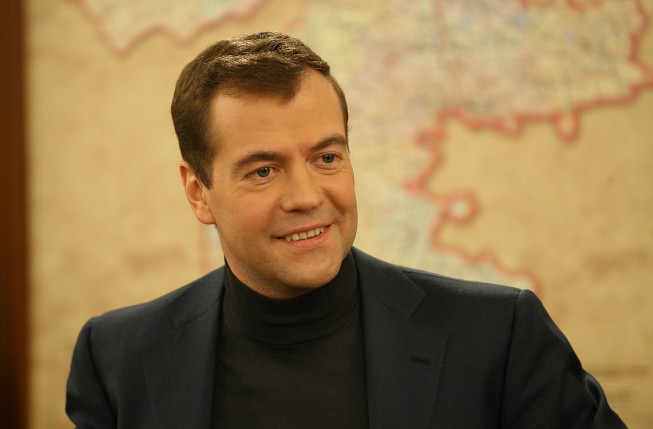
Soft Power with an Iron Fist: Putin Administration to Change the Face of Russia’s Foreign Policy Toward Its Neighbors
Publication: Eurasia Daily Monitor Volume: 9 Issue: 163
By:

Prime Minister Dmitry Medvedev’s talk at the Russian Foreign Ministry on September 3, when he powerfully stressed the need for his country to strengthen and consolidate its “soft power” (mid.ru, September 3), may look to an outside observer like an optimistic signal and a long-awaited change in Russia’s foreign policy. This benign view, however, could not be more wrong. Rather, the Kremlin is seeking to exploit the Western concept of “soft power”—which basically implies the power of attraction—and reframing it as a euphemism for coercive policy and economic arm-twisting.
One of the key participants in the meeting at the foreign ministry was Rossotrudnichestvo, Russia’s analogue of the United States’ foreign aid agency USAID, which is striving to become the spearhead of Russia’s “soft power” efforts. Konstantin Kosachev, the agency’s head, explained to the Voice of Russia the goals of his organization. It boils down to transforming the Russian-speaking community in foreign countries into a force capable of influencing the governments of host nations to the effect of promoting the Russian Federation’s foreign policy interests in these states (Voice of Russia, September 3).
It is true that Russian foreign policy has a long-standing tradition of exploiting Western concepts and liberal-sounding rhetoric as window-dressing for Moscow’s assertive domestic and foreign policies. Examples include the well-known term of “sovereign democracy” to legitimize its authoritarian domestic rule, or the claimed “humanitarian intervention” and “peace enforcement” in August 2008 to cover for the military invasion of Georgia.
The difference this time lies in the institutionalized and strategic character of what appears to be a game-changer in Russia’s foreign policy toward the other former Soviet republics. On July 27, the Russian presidential administration launched an open tender, inviting research proposals exploring issues like the role of Russian capital in the economies of countries in the Caucasus, as well as an evaluation of the concepts and approaches toward Ukraine’s federalization, prevailing in its administrative regions. The Kremlin appears to also be interested in what influence domestic financial and economic groups have on the political processes in Moldova and Latvia, as well as in factors determining the emergence of political elites in Central Asia along with explanations for their ability to maintain a continuity of governance (zakupki.gov.ru, tender # 0173100011512000062, July 27).
The research on Moldova and Latvia is supposed to identify the ways and methods employed by the largest local businesses and oligarchic groups to transform the domestic and foreign policies of their governments. Particularly, the Russian presidential administration would like to learn how these groups influence the law-making process, what is the structure of their representation in the Latvian Parliament and other state institutions, the groups’ approaches to political party creation and consolidation of power, as well as the lobbying process for economic interests. Finally, the Kremlin would like to understand the dynamics of interaction between “pro-Western” and “pro-Russian” groups and how the Russian Federation could exploit all of those to “develop bilateral cooperation” (zakupki.gov.ru).
Alexey Malashenko of the Carnegie Moscow Center believes that by referring to successful “bilateral cooperation,” the Kremlin means nothing less than a display of extreme loyalty toward Russia from these groups (Vedomosti.ru, August 16). Vedomosti also writes, quoting a source inside the Kremlin, that this research tender is indicative of the current administration’s firm plans to build a consolidated Eurasian Union.
It is not a coincidence that the three states that, in Moscow’s view, are best positioned for Russia’s active political influence have a significant percentage of their population that uses Russian as the main language of communication (by modest accounts, over 30 percent in Latvia and Moldova, and over 40 percent in Ukraine). The Kremlin has understood that sorting out problems with its neighbors through military force is too costly—just in the first week of war against Georgia in August 2008, Russian foreign reserves dropped by $16.4 billion (ng.ru, August 22, 2008). Thus, Russia has reverted to a Cold War–style of political warfare, which includes buying out politicians, funding political parties and movements, exploiting weak institutions, encouraging secessionist movements, and even armed rebellions.
It is also important to note that the Kremlin is not interested in learning “whether” Russia could influence the domestic affairs of these states, but instead is soliciting coherent strategies about “how” it can be done. This confidence is based on Russia’s recent success stories, indicating it possesses significant potential for effective foreign pressure on these post-Soviet countries. For instance, after decades of resistance, the Ukrainian Parliament has finally voted on the controversial bill granting the Russian language a regional status (rbk.ru, July 3).
In Moldova, Russia’s efforts have also been rather successful. Shortly after being visited by Russian Ambassador Farit Mukhametshin, the Gagauz autonomy and the Balti municipality (the second largest city in right-bank Moldova), began mounting pressure on the central government in Chisinau concerning the regional use of the Russian language (protv.md, July 11; publica.md, July 20). The Russian Ambassador to Moldova also publicly praised and encouraged a referendum initiative on Moldova joining the Russian-led Customs Union (nr2.ru/kishinev, June 20). Though the initiative was invalidated by the Central Election Commission due to an insufficient number of valid signatures, the referendum has recently enlisted the support of the parliamentary Communist Party (prime.md, September 3).
It very much appears that Russia is willing to explore the ongoing decrease in interest both in the United States and the European Union toward the post-Soviet space by launching a foreign policy offensive. No longer relying on its earlier coercive rhetoric and actions, the Kremlin’s new foreign policy strategy toward its neighbors is, thus, definitely a change in tact; but Moscow’s intentions, nonetheless, remain the same.




